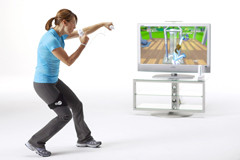Exergames: a new step toward fitness?

What’s the best type of physical activity? One you enjoy enough to do every day. Active-play videogames, also known as exergames, are a high-tech approach to fitness that could help some people become more active and stay that way.
As I write in the March 2012 Harvard Heart Letter, exergames offer muscle-strengthening workouts, balance and stretching games, aerobic exercises and dancing, martial arts, and simulated recreational activities such as golf, skiing, and more. (You can read the full article on the Harvard Health website.)
Current exergames deliver moderate workouts at best. The Wii Aerobics package, for example, gives you a workout that’s the equivalent of walking at 3 miles per hour. This won’t help you lose weight, but it can give you the kind of moderate-intensity activity that each of us should be doing at a minimum every day.
Some fitness and senior centers are now incorporating exergames into their facilities. For a home system, you’ll probably spend about $250 for the basics — console, accessories such as handheld controls or balance board, and software.
Do they work?
The study of how exergames affect fitness and health is still in its infancy. Last year, the American Heart Association (AHA) convened a panel to begin exploring what role exergames may play in health and fitness, especially in people with heart disease or at risk for it. The panel’s report, “The Power of Play: Innovations in Getting Active Summit,” was published in the journal Circulation.
While that research is underway, some experts are excited that they may have another way to get adults and children moving. “You can become more fit with relatively simple activities, so these games have a lot of potential,” Dr. JoAnne Foody, director of the Cardiovascular Wellness Service at Harvard-affiliated Brigham and Women’s Hospital, told the Heart Letter.
For now, though, don’t let exergames nudge aside your participation in “real” sports and recreational activities. In terms of energy expended and pure enjoyment, the real things are bound to be more healthful and rewarding than electronic simulations.
(Photo courtesy of Electronic Arts Inc.)
About the Author

Lloyd Resnick, Former Editor, Harvard Heart Letter
Disclaimer:
As a service to our readers, Harvard Health Publishing provides access to our library of archived content. Please note the date of last review or update on all articles.
No content on this site, regardless of date, should ever be used as a substitute for direct medical advice from your doctor or other qualified clinician.











.jpg)

